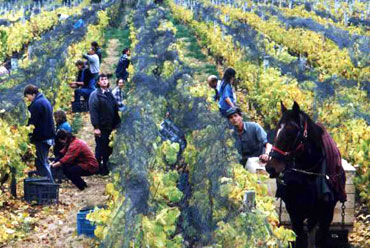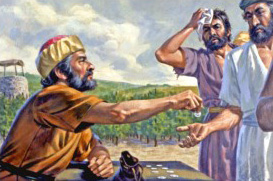May
2012 - Vol. 60

The
Outrageous Generosity
of
God
Parable
of the laborers in the vineyard
..
By Jeanne Kun
The
parable challenges the attitude and behavior of the listeners. The question
is addressed to them: are you jealous because I am good for your neighbors?
This question challenges them to allow such a God into their life.
–
Jan Lambrecht, SJ, Out of the Treasure:
The
Parables in the Gospel of Matthew
“I choose to give
to this last the same as I give to you” (Matthew 20:14). How we react to
the way the landholder paid the men he hired to work in his vineyard depends
on the state of our own hearts. We could respond, “Oh, what a generous
employer!” or we could say, “Isn’t that terribly unfair?”
In giving so
liberally to those who had worked only a short time, the landowner was
taking nothing away from the laborers who had worked all day. “I am doing
you no wrong,” he reminded those who felt cheated. “Did you not agree with
me for the usual daily wage?” (Matthew 20:13). Then he got at the heart
of the problem by asking the grumblers, “Are you envious because I am generous?”
(20:15).
As he so often
did during his public ministry, Jesus once again turned customary rules
and expectations upside down. He was not concerned here with labor relations
or market-based economics. Rather, with this story and its surprising twist,
Jesus exposed the canker of envy in the human heart and vividly illustrated
the mercy and generosity of God – generosity
so unstinting that it confounds not only our logic but also our sense of
justice.

As long as
we insist on equating “fairness” with “equality,” God’s generosity will
never make sense to us. We need to get past our human tendency to interpret
another’s gain as our loss before we can truly appreciate the magnificence
of God’s gift to each of us. The fact is, no matter how long we work or
how hard we try, we can never earn God’s love or his salvation through
our own efforts. God freely loves us. He is eager to welcome all of us
into his kingdom – sinners and
latecomers as well as the upstanding and hardworking. Unreasonable? Outrageous?
That’s the extravagant nature of divine mercy.
In its setting
in Matthew’s gospel, the parable is addressed to Jesus’ disciples who had
left everything behind to follow him (Matthew 19:27-30). Perhaps Jesus
wanted his closest companions to know that despite their sacrifice, they
were not to think they merited a greater reward than others who would later
follow him. If Jesus also told this parable to the crowds that flocked
to listen to him, he may have been warning self-righteous scribes and Pharisees
not to resent the favor he shows to sinners – a
warning that we, too, should take to heart.
Since Matthew
addressed his gospel most particularly to the Jewish Christians of the
early church, we might further recognize in this parable an admonition
to them, “God’s chosen people.” The gentiles, who had not labored under
the strict Mosaic code for centuries, were the latecomers, yet they were
receiving the same blessing of salvation as the Jewish Christians. The
Jewish Christians were not to begrudge the grace freely given to the gentiles,
nor were they justified in looking down on them.
Since Jesus
first told this disquieting parable two thousand years ago, it has continued
to speak to diverse audiences and probe the hearts of countless men and
women. Today the parable of the laborers in the vineyard – perhaps
better named the parable of the good employer – still
challenges us with its timeless message that God freely offers to everyone
who would receive it the same mercy and reward: eternal life with him.
And there is no room for envy in his heavenly kingdom!
In
the Spotlight
A Denarius a Day
In
the early days of human history, trade was conducted by bartering, and
payment for services was made in goods. Later, precious metals such as
gold and silver were used, with value measured by weight. Coinage was introduced
around the seventh century B.C. The earliest coins were simply pieces of
metal of a standard weight impressed with a seal. Consequently, coins were
often named after the weight they represented – a
shekel equaled 11.4 grams; a talent, 30 kilograms.
During
the first century A.D., three different currencies were used in Palestine:
the official imperial money (Roman standard); provincial money minted in
Antioch and Tyre (Greek standard); and local Jewish money, most likely
minted in Caesarea.
The
denarius was a Roman coin made of silver. During Jesus’ ministry, the denarius
showed the head of Tiberius, the emperor of the Roman Empire from A.D.
17 to 37. Soldiers and farm workers were paid a denarius a day for their
services or labor, which was considered the standard wage, enough to cover
life’s basic necessities.
In
the Spotlight
Eye of Evil, Eye
of Envy
“Are
you envious because I am generous?” the landowner asked the grumblers.
The literal translation of the original Greek of Matthew’s gospel would
be, “Is your eye evil because I am good?”
This
“evil eye” is the eye of envy. The Book of Sirach, which includes maxims
and sayings written in Hebrew by the Jewish sage Ben Sira around 200 B.C.,
was later translated into Greek by the author’s grandson. A passage from
this Greek translation reads, “The eye of the greedy person is not satisfied
with his share. . . . An evil eye is envious over bread, and it is lacking
on his table” (Sirach 14:9-10). A similar expression equating the eye with
greed, avarice, and envy was used again by Ben Sira in Sirach 31:13. Jesus
refers to the state of the “eye” as healthy or unhealthy, calling it the
lamp that brings light or darkness to the rest of the body (Matthew 6:22-23).
In
the Spotlight
Celebrating Our
Oneness
Suppose
the all-day workers in the parable had walked home with the one-hour workers,
rejoicing all the way over the generosity of the employer. Wouldn’t that
have been a beautiful time of sharing for all? If we are able to rejoice
in God’s grace for all, without comparisons and without envy, we live in
shared joy and tender appreciation for everyone. We learn then what it
means to love both neighbor and enemy. . . .
It
is a rare person who loves enough to rejoice in all goodness, whether he
or she benefits directly or not. Yet we can all practice this happy attitude.
When we hear of something wonderful falling into another’s life, we can
set aside that nagging “But what about me?” and simply enjoy the beauty
with that person. We may even celebrate it. It is recommended that we do
this, even though in the beginning it may feel unreal, if we have habitually
envied every good thing that happened to others. Our emotions carry on
in their habits, but do our emotions tell us the truth? Rarely! . . .
Let’s
not count the hours we work, nor the hours another works. Let us press
on, our eyes on the goal and our hands joined for the going. God awaits
his full entry into our hearts.
–
Marilyn
Gustin, How to Read and Pray the Parables
Excerpted
from Treasures
Uncovered: The Parables of Jesus, by Jeanne Kun (The
Word Among Us Press, © 2005). Used with permission. This
book can be ordered online.
Jeanne
Kun is President of Bethany
Association and a senior woman leader in the Word
of Life Community, Ann Arbor, Michigan, USA. |
Matthew
20:1-16
[Jesus
said to his disciples:] “For the kingdom of heaven is like a landowner
who went out early in the morning to hire laborers for his vineyard. After
agreeing with the laborers for the usual daily wage [a denarius], he sent
them into his vineyard. When he went out about nine o’clock, he saw others
standing idle in the market place; and he said to them, ‘You also go into
the vineyard, and I will pay you whatever is right.’ So they went. When
he went out again about noon and about three o’clock, he did the same.
And about five o’clock he went out and found others standing around; and
he said to them, ‘Why are you standing here idle all day?’ They said to
him, ‘Because no one has hired us.’ He said to them, ‘You also go into
the vineyard.’ When evening came, the owner of the vineyard said to his
manager, ‘Call the laborers and give them their pay, beginning with the
last and then going to the first.’ When those hired about five o’clock
came, each of them received the usual daily wage [a denarius]. Now when
the first came, they thought they would receive more; but each of them
also received the usual daily wage. And when they received it, they grumbled
against the landowner, saying, ‘These last worked only one hour, and you
have made them equal to us who have borne the burden of the day and the
scorching heat.’ But he replied to one of them, ‘Friend, I am doing you
no wrong; did you not agree with me for the usual daily wage? Take what
belongs to you and go; I choose to give to this last the same as I give
to you. Am I not allowed to do what I choose with what belongs to me? Or
are you envious because I am generous?’ So the last will be first, and
the first will be last.”
In
the Spotlight
Contemporary Voices
What
galls those who were hired first (and us) is that there is not equal pay
for equal work. It is within the frustration over this imbalance that the
parable makes its point. If we insist that justice be followed to the letter,
then God is not free to be merciful. If mercy, however, were taken off
the table, we would all be lost. For the most essential aspects of our
lives go beyond what we deserve. Are we owed life or health or love? It
is only because God gives us more than what we deserve that we have happiness,
salvation, and eternal life.
God
is not limited by our desire to measure everything out according to our
merits. God will be generous to whomever God chooses. Even though we may
at times be peeved that others are recipients of God’s mercy, such gifts
to them are good news for us. Their God is our God. Mercy to them is an
assurance that mercy will be available to us.
– George
Smiga, God’s Word Today
Pondering the
Word
1. The landowner
merely told those hired later in the day that he would pay them “whatever
is right” (Matthew 20:3). What does this seem to imply? How does this add
to the suspense of the parable and increase the shock value of its ending?
2. How did
the landowner respond to the grumblers’ complaints? Do you think he adequately
addressed their issues? Why or why not?
3. Explain
how you think Verse 16 – “So
the last will be first, and the first will be last” –
relates to the rest of the parable. Note that a similar verse (Matthew
19:30) provides a link between Jesus’ previous conversation with his disciples
and this parable. What does Matthew’s framing of the parable in this way
suggest to you?
4. How does
the parable of the laborers in the vineyard act as a metaphor for the final
judgment?
5. What have
you learned about human efforts and God’s grace from this parable? In what
ways does this parable summarize the whole message of the gospels?
Grow!
1. In what
ways does the action of the landowner reflect your concept of God and his
mercy? In what ways does it differ?
2. How do you
usually respond to the good fortune of others? If you have ever felt jealous
or resentful of another person’s blessing or benefit, how did you handle
your feelings?
3. Recall a
situation when you were generous or acted with mercy toward someone. How
did your kindness affect this person? What motivated you to act so generously?
4. Several
Fathers of the Church interpreted the hours of the day in the parable as
an analogy for the point in life when a person responded to God’s call
– childhood, adolescence, midlife, the
later years. Where would you place yourself in such a time framework?
5. How does
this parable challenge your own concepts of fairness and justice? How does
it move you to embrace God’s idea of “fairness”?
 Reflect! Reflect!
1.
Reflect on these words from Pope John Paul II calling you to labor in God’s
vineyard:
From
that distant day the call of the Lord Jesus “You go into my vineyard too”
(Matthew 20:4) never fails to resound in the course of history: It is addressed
to every person who comes into this world.... Since the work that awaits
everyone in the vineyard of the Lord is so great, there is no place for
idleness.
God
calls me and sends me forth as a laborer in his vineyard. He calls me and
sends me forth to work for the coming of his kingdom in history. This personal
vocation and mission defines the dignity and the responsibility of each
member of the lay faithful. (On the Vocation and the Mission of the Lay
Faithful in the Church and in the World)
2.
Reflect on the following passages to deepen your appreciation of the parable
you have just studied:
The
greedy person stirs up strife,
but whoever trusts in the LORD will be enriched. (Proverbs 28:25)
The
eye of the greedy person is not satisfied with his share; greedy injustice
withers the soul. (Sirach 14:9)
What
then are we to say? Is there injustice on God’s part? By no means! For
he says to Moses, “I will have mercy on whom I have mercy, and I will have
compassion on whom I have compassion.”
So
it depends not on human will or exertion, but on God who shows mercy....
So then he has mercy on whomever he chooses.... (Romans 9:14-16, 18)
God,
who is rich in mercy, out of the great love with which he loved us even
when we were dead through our trespasses, made us alive together with Christ
– by grace you have been
saved – and
raised us up with him and seated us with him in the heavenly places in
Christ Jesus, so that in the ages to come he might show the immeasurable
riches of his grace in kindness toward us in Christ Jesus. (Ephesians 2:4-7)
[W]hen
the goodness and loving kindness of God our Savior appeared, he saved us,
not because of any works of righteousness that we had done, but according
to his mercy, through the water of rebirth and renewal by the Holy Spirit.
This Spirit he poured out on us richly through Jesus Christ our Savior,
so that, having been justified by his grace, we might become heirs according
to the hope of eternal life. (Titus 3:4-7)
Act!
Make a list
of the ways you have experienced God’s generosity to you. Then turn your
list into your own “litany of thanksgiving,” praising God and thanking
him for his mercy and loving kindness. |